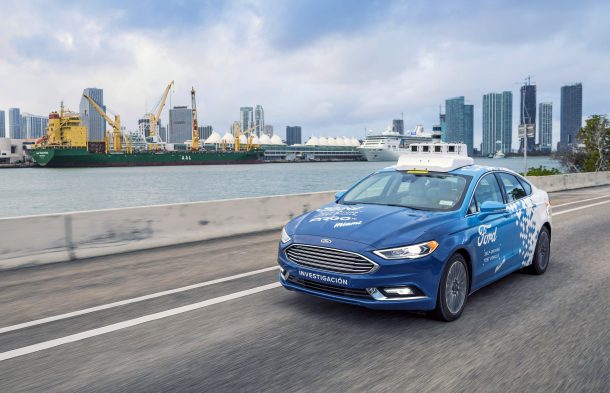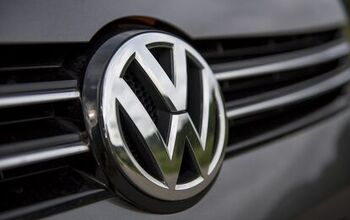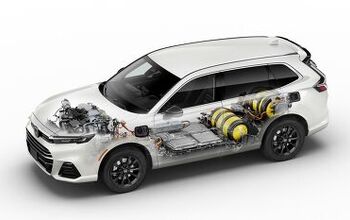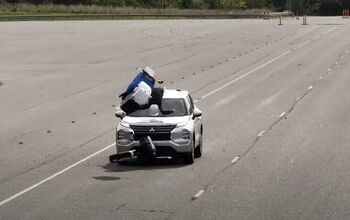Volkswagen - and With It, Ford - Secures Self-driving Deal

U.S. self-driving startup Argo AI has completed a deal with Volkswagen AG on self-driving vehicle technology, fulfilling VW’s wishes for a secure and affordable source of gee-whiz gadgetry for future mobility solutions.
The deal, valued at $2.6 billion, will see VW fork over a cool billion while folding its Autonomous Intelligent Driving team into Argo AI’s operations. The automaker’s alliance partner, Ford, pledged $1 billion (over five years) to the startup in 2017, before last year’s tie-up with the German automaker.
Together, VW and Ford plan to use self-driving hardware and software suites developed by Argo AI to fuel its mobility ambitions in North America and Europe. A tentative deal was inked last July.
The Pittsburgh-based startup released a statement from CEO Bryan Salesky and its European arm’s veep, Reinhard Stolle, claiming “with the close of Volkswagen AG’s investment, we become a global company.”
“This news not only solidifies our well-capitalized position, but differentiates us as the only self-driving technology platform company with partnerships and commercial agreements for deployments across the U.S. and Europe,” the two said.
As part of the deal, Ford and VW will receive minority stakes in Argo AI.
“Working together with Argo AI positions both Ford and Volkswagen to better serve our future customers while improving cost and capital efficiencies,” John Lawler, CEO of Ford Autonomous Vehicles LLC and vice-president of the automaker’s mobility partnerships, said in a Medium post. “While the uncertainty of today’s business environment has created challenges for partnerships and investments in the self-driving space, this collaboration remains on track and will be a positive development for everyone involved
Ford aims to tap into the potential riches of autonomous ride-hailing and other fleet services by releasing a fleet of its own self-driving vehicles. Detroit rival Fiat Chrysler already has a plan and a fleet underway via its partnership with Waymo, while General Motors has its Honda-backed Cruise LLC venture.
“Building a safe, scalable and trusted self-driving service, however, is no small task,” Lawler wrote. “It’s also not a cheap one. We’ve committed to spending more than $4 billion through 2023 on the development of our self-driving service. A large part of this investment is dedicated to developing the self-driving system. With Volkswagen’s investment in Argo AI, we will now share the cost of developing Argo AI’s technology.”
The Blue Oval hoped to have its self-driving fleet in operation by 2021, but the arrival of the pandemic put the kibosh on those plans. The fleet is now expected to hit the road in 2022.
[Image: Ford]

More by Steph Willems
Latest Car Reviews
Read moreLatest Product Reviews
Read moreRecent Comments
- CEastwood I have a friend who drives an early aughts Forrester who refuses to get rid of it no matter all it's problems . I believe it's the head gasket eater edition . He takes great pains regularly putting in some additive that is supposed prevent head gasket problems only to be told by his mechanic on the latest timing belt change that the heads are staring to seep . Mechanics must love making money off those cars and their flawed engine design . Below is another satisfied customer of what has to be one of the least reliable Japanese cars .https://www.theautopian.com/i-regret-buying-a-new-subaru/
- Wjtinfwb 157k is not insignificant, even for a Honda. A lot would depend on the maintenance records and the environment the car was operated in. Up to date maintenance and updated wear items like brakes, shocks, belts, etc. done recently? Where did those 157k miles accumulate? West Texas on open, smooth roads that are relatively easy on the chassis or Michigan, with bomb crater potholes, snow and salt that take their toll on the underpinnings. That Honda 4 will run forever with decent maintenance but the underneath bits deteriorate on a Honda just like they do on a Chevy.
- Namesakeone Yes, for two reasons: The idea of a robot making decisions based on algorithms does not seem to be in anyone's best interest, and the thought of trucking companies salivating over using a computer to replace the salary of a human driver means a lot more people in the unemployment lines.
- Bd2 Powertrain reliability of Boxer engines is always questionable. I'll never understand why Subaru held onto them for so long. Smartstream is a solid engine platform as is the Veracruz 3.8L V6.
- SPPPP I suppose I am afraid of autonomous cars in a certain sense. I prefer to drive myself when I go places. If I ride as a passenger in another driver's car, I can see if that person looks alert and fit for purpose. If that person seems likely to crash, I can intervene, and attempt to bring them back to attention. If there is no human driver, there will probably be no warning signs of an impending crash.But this is less significant than the over-arching fear of humans using autonomous driving as a tool to disempower and devalue other humans. As each generation "can't be trusted" with more and more things, we seem to be turning more passive and infantile. I fear that it will weaken our society and make it more prone to exploitation from within, and/or conquest from the outside.


































Comments
Join the conversation
Ford currently has something like $37B in cash (including the latest borrowings): https://finance.yahoo.com/news/ford-hoards-cash-withdraws-profit-163246072.html And plans to drop $4B of that on its "self driving service" during generally tough business conditions [ex. dividend is suspended]. So clearly they are serious about this. Someone should warn them that it's a dead end [if it is] - because plainly they don't view it that way.
I hate to be a wet noodle, but considering the goal for the utopians among us is the replace private vehicle ownership with shared autonomous vehicles, there is a new significant hurdle to consider. How can such vehicles be kept sanitary between rides in a post-covid world? Now that the public knows how fast some novel (or known) infectious disease can spread,a public dependent on autonomous vehicles for nearly every errand will have to contend with their potential as a major vector of disease transmission.